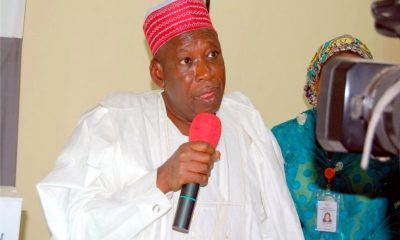Oil & Energy
The Future May Not Be As Electric As We Think

Virtually every single forecast about the future of transport focuses on its electrification – on the idea that Electric Vehicles will take over roads, displacing the internal combustion engine Internal Combustion Engine (ICE) and making it history.
Not everyone agrees, however, and that includes Renault, China’s Geely and, as of last month, Saudi Aramco. The three are investing in a company that develops powertrain technology for internal combustion engine vehicles. The future may not be as electric as we may expect.
Horse Powertrain came into existence at the end of May as a 50:50 joint venture between Renault and Geely. At the time, Renault’s Chief Executive said the company would aim to become a leader in “ultra-low emission internal combustion engines and high economy hybrid technologies”.
Decarbonisation, then, remains the top priority. Yet Renault and Geely are opting for an alternative way to achieve it, through fuel efficiency and other tech advancements in internal combustion rather than through total electrification.
It is no wonder Aramco is joining the party, especially in light of the recent performance of its EV darling, Lucid Motors.
Lucid has seen its share price plummet from over $50 apiece to less than $9 in three years and has missed its own delivery target for the first half of this year even though it boasted record deliveries of 2,394 cars.
The Saudi oil giant likes to spread its eggs across several baskets, and it looks like the ICE basket is still quite popular. People are still buying a lot more internal combustion engine cars than electric vehicles.
A lot of EV drivers want to go back to their internal combustion engine car. Things are not looking good for the electrification of transport, with the normal glitches of new technology still being sorted out. However, they are looking as robust as ever for internal combustion.
“It will be incredibly expensive for the world to completely stamp out, or do without internal combustion engines”, Yasser Mufti, Executive Vice-President at Saudi Aramco, who was in charge of the Horse Powertrain deal, told the Financial Times.
“If you look at affordability and a lot of other factors, I do think they will be around for a very, very long time”, he stated.
Affordability is indeed one of the factors that make drivers loyal to the ICE technology. For all the efforts EV makers have been putting into lowering the price of their electric vehicles, and for all the government support of the technology, EVs remain costlier than comparable internal combustion engine vehicles.
Of course, affordability is only part of the car equation. Another is fueling or charging time and on this, the ICE car once again beats the EV.
For all the talk about how convenient it was to charge your EV overnight in the comfort of your own garage, it has been dawning on forecasting EV bulls that globally, only a minority of drivers have a garage to charge an EV in, while most would need to rely on public chargers.
Also, only a minority of drivers would be willing to spend hours charging their car overnight or not.
Perhaps the best testimonial to the enduring power of the internal combustion engine were the latest car sales figures from China.
The world’s biggest market, China, has been breaking records in EV sales. This seems to have created a perception that half of all cars in China are electric. In fact, the reality is quite different.
Xinhua reported earlier this week that the total number of cars on Chinese roads had reached 440 million at the end of June. Of these, the data showed, new energy vehicles had a share of 24.72 million. Of these, 18.13 million were plug-in electric vehicles — what we commonly call EVs, and the rest were hybrids.
In percentage terms, then, EVs represent barely a 4.1% of the Chinese market. In other words, even in the world’s biggest EV market, with billions spent on charging infrastructure and making EVs dirt cheap, most drivers still prefer internal combustion vehicles.
“We believe that as far out as 2035, 2040 and even beyond 2040 we still see a significant number of ICE vehicles”, Matias Giannini, Chief Executive of Horse Powertrain, told the FT.
“More than half for sure, and up to 60 per cent of the population will still have some sort of an engine, whether it is pure ICE, a full hybrid or a plug-in hybrid”, he added.
The internal combustion engine has survived so long and remained the overwhelmingly dominant transportation technology for one simple reason: it has been superior to alternatives and its benefits have outweighed the costs consistently.
It is at the cost-benefit analysis state that the EV revolution tripped and fell — because it seems that no one bothered to do that analysis.
So, the market made it for them, with the EV surge celebrated loudly last year slowing down before the year was even over. Horse Powertrain may yet acquire new shareholders.
Slav writes for Oilprice.com.
By: Irina Slav
Oil & Energy
Bill Prohibiting Gas Flaring Passes 2nd Reading

The Bill for an act to prohibit gas flaring, encourage commodity utilisation, and provide for penalties and remedies for gas flaring violations has passed its second reading in the House of Representatives.
Sponsored by the Member representing Ikorodu Federal Constituency (APC, Lagos), Babajimi Adegoke Benson, the bill seeks to prohibit the flaring and venting of natural gas, except in strictly regulated circumstances, while encouraging the utilisation of gas resources to foster economic growth and energy generation.
The proposed legislation aims to mitigate the environmental, health, and economic impacts of gas flaring, aligning Nigeria’s oil and gas operations with international climate change commitments.
Offenders, who violate the provisions of the proposed law, would face stringent penalties, including fines of $5 per 1,000 standard cubic feet of gas flared and potential suspension of operations for repeat violations.
Leading debate on the general principles of the bill, Benson said gas flaring has plagued Nigeria for decades, resulting to severe environmental degradation, public health crises, and economic losses while it environmentally, contributes to greenhouse gas emissions, global warming, and acid rain, exacerbating climate challenges.
The lawmaker said public health impacts of the practice are equally dire, as pollutants from gas flaring cause respiratory and cardiovascular diseases, particularly among residents of communities close to flaring sites.
According to him, economically, flaring results in the waste of a valuable resource that could otherwise be harnessed for energy generation or exported to generate revenue.
Benson insisted that the bill was designed to address those issues while bringing Nigeria in line with global standards such as the Paris Agreement on climate change.
“The bill provides for a comprehensive prohibition of gas flaring except in emergencies or when explicitly authorised by the Nigerian Upstream Petroleum Regulatory Commission (NUPRC).
“Operators are required to submit and implement Gas Utilisation Plans, detailing how gas that would otherwise be flared will be captured, processed, or commercialised.
“Offenders, who violate these provisions, face stringent penalties, including fines of $5 per 1,000 standard cubic feet of gas flared and potential suspension of operations for repeat violations. Furthermore, the Bill ensures that communities affected by gas flaring are entitled to compensation and environmental restoration, creating a mechanism for redress.
“Transparency and accountability are integral to the enforcement framework of this Bill. Operators must submit regular reports on gas flaring incidents, which will be audited and made publicly available by the NUPRC. This approach ensures public oversight and stakeholder engagement, fostering trust and compliance.
“Nigeria’s adoption of this Bill positions the country to emulate such success, ensuring a balance between environmental stewardship and economic development.
“The implementation of this Bill will be overseen by the Nigerian Upstream Petroleum Regulatory Commission, which will monitor compliance through regular audits, enforce penalties, and facilitate gas utilisation projects in collaboration with operators and development partners.
“The Anti-Gas Flaring (Prohibition and Enforcement) Bill, 2024, is a timely and necessary response to one of Nigeria’s most pressing environmental challenges. Its provisions are both practical and forward-looking, addressing immediate concerns while laying the groundwork for a sustainable future.
“I urge all Honourable Members to support the Second Reading of this Bill as a demonstration of our collective commitment to environmental protection, public health and economic progress”, he added.
###
Oil & Energy
‘Indigenous Companies To Gain From Shell’s Contract Awards’

Oil major, Shell, has restated its commitment to the development of Nigerian companies through contract awards and scaling up of expertise.
Managing Director, Shell Nigeria Exploration and Production Company ((SNEPCO) Limited, Ron Adams, made the remark while speaking at the Opening Ceremony of the 13th edition of the Practical Nigerian Content forum held in Yenagoa, Bayelsa State, with the theme “Deepening the Next Frontier for Nigerian Content Implementation”.
Represented by the Manager, Business Opportunity, SNEPCO’s Bonga South-West Aparo Project, Olaposi Fadahunsi, he said several benefitting companies had taken advantage of the patronage to expand their operations and improve their expertise and financial strength.
Adams said, “Shell companies execute a large proportion of their activities through contracts with third parties, and Nigeria-registered companies have been key beneficiaries of this policy aimed at powering Nigeria’s progress”.
He emphasized that Shell companies in Nigeria also continued to develop indigenous manpower through scholarship programmes with over 3,772 undergraduate and 109 Niger Delta post graduate scholarships since 2016.
“As we speak, beneficiaries of the 13th edition of the Niger Delta Post Graduate Scholarship awards are pursuing their studies in the United Kingdom. The employability rate of the scheme is high with over 98% of the graduates who won the awards securing employment in the oil and gas industry, academia and Information Technology, among other sectors, within one year of completing their studies”.
He commended the Nigeria Content Development and Monitoring Board (NCDMB) for ensuring compliance with the Nigerian Content Act saying “Nigerian content will continue to be an important part of Shell operations”.
The four-day conference hosted by the Nigerian Content Development and Monitoring Board (NCDMB) and participating companies reviewed progress on the development of Nigerian content pertaining to the implementation of the Nigerian Oil and Gas Industry Development (NOGICD) Act since it was enacted in 2010.
Shell companies in Nigeria are among the more than 700 oil and gas entities that participated in the forum with a strong message of support for Nigerian companies, having awarded contracts worth $1.98 billion to the businesses in 2023 in continuing effort to develop Nigerian content in the oil and gas industry.
Oil & Energy
NNPC Begins Export From PH Refinery

The Nigerian National Petroleum Company Limited (NNPCL) has sold the first cargo of Port-Harcourt low sulfur straight run fuel oil (LSSR) to Dubai-based Gulf Transport & Trading Limited (GTT).
The company is expected to load the cargo in the coming days onboard the Wonder Star MR1 ship, signalling the commencement of operations at the plant and the exportation of petroleum products.
The ship would load 15,000 metric tons of the product, which translates to about 13.6 million litres.
Although the volume coming from the NNPC into the global market is still small, the development has the potential to impact the Very Low Sulphur Fuel Oil (VLSFO) benchmarks in the future, while changing the market realities for Atlantic Basin exporters into Nigeria and other regions.
The sulfur content of the export by NNPC stands at 0.26 per cent per wt and a 0.918 g/ml density at 15°C, according to Kpler, a data and analysis company.
The cargo was reportedly sold at an $8.50/t discount to the NWE 0.5 per cent benchmark on a Free on Board (FOB) basis.
Kpler reported that the development would help displace imports from traditional suppliers in Africa and Europe, as Nigeria’s falling clean product (CPP) imports are already decreasing, dragging imports into the wider West Africa region lower as well.
-

 News2 days ago
News2 days agoForge Unity For Progress, Fubara Urges Nigerian Youths …Accepts Beacon Of Hope Award
-
Politics2 days ago
Inclusivity: Chief Whip Makes Case For Women
-
Sports2 days ago
Subsea Cycling Club Chairman Solicits For Support
-
Nation2 days ago
Director Tasks ICAD Members On Professionalism
-
Rivers2 days ago
Ministry Debunks Akpana’s Leadership Of JONAPWD … Sets Stage for Peaceful Election
-

 Editorial2 days ago
Editorial2 days agoA New Dawn For Rivers’ Workers
-

 Business2 days ago
Business2 days agoNADF, NASC Partner To Boost Food Security
-

 Politics2 days ago
Politics2 days agoGanduje Gets February 13 Date For Hearing In Alleged Bribery Trial

